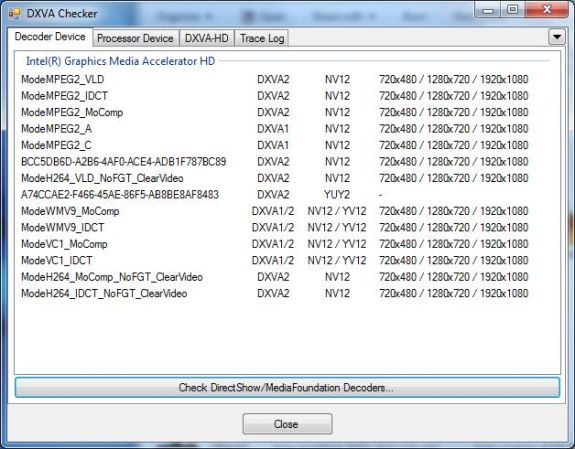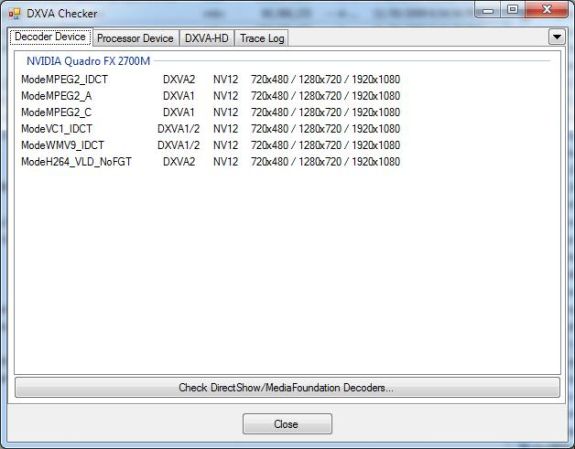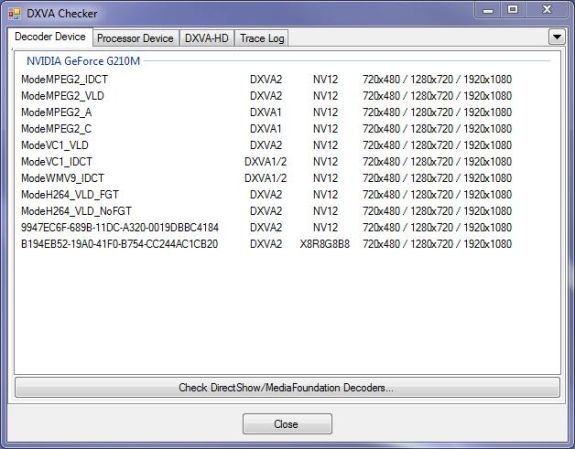HD Video Decoding on GPUs with VLC 1.1.0
by Ganesh T S on June 25, 2010 4:35 AM EST- Posted in
- Home Theater
- HTPC
Catalyst 10.6 does not provide any support for VLC's GPU acceleration methodology, but AMD seems to suggest that a update to fix this is coming soon. Knowing ATI's lethargy in fixing drivers for anything not related to gaming, we decided to ignore their GPUs for the time being.
[UPDATE 1: June 26, 2010: We heard back from AMD PR as well as the concerned VLC developer, and we are told that Catalyst 10.7 (expected by mid-July), and VLC 1.1.1 (expected in 3 - 4 days) enable acceleration on ATI GPUs also. Apparently, they have verified that the acceleration works in the labs, and are waiting on final QA. I am now willing to reconsider my earlier opinion on ATI's lethargy and hope that this sort of response is a sign of good things to come for AMD/ATI HTPC users.]
[UPDATE 2: July 2, 2010: AMD provided us with the pre-release Catalyst 10.7, and Jean-Baptiste gave us the VLC 1.1.1 build. On one of AMD's recent Radeon chipsets, GPU acceleration works better than Nvidia's. Also, it looks likely that Radeon 3xxx users will be unable to take advantage of VLC's acceleration. More details will follow once Catalyst 10.7 is officially released].
VLC developers couldn't test their acceleration methodology on the Intel IGPs at all. As end users, we decided to test it out for them.
We utilized 3 test beds for our evaluation
1. Intel IGP - Arrandale ClearVideo: Gateway NV5935u
2. Nvidia - Quadro FX2700M PureVideo VP2: Customised HP 8730w [ Core 2 Duo T9400 / 4GB RAM ]
3. Nvidia - GeForce G210M PureVideo VP4: Sony Vaio VPCCW13FX/R [ PDF ]
The DXVA capabilities of each platform are evident in the screenshots below.
All machines were tested using VLC 1.1.0 on Microsoft Windows 7, using a 37" Toshiba Regza HDTV connected via HDMI through an Onkyo TX-SR606, at 1920x1080p resolution in Extend mode (with the primary screen running at 1366x768). One set of tests was run with GPU acceleration disabled, and another with GPU acceleration enabled. CPU usage was tracked for both runs and the maximum values over the course of playback compared.
GPU acceleration has been provided by VLC for MPEG-2, H.264 and VC-1. Since MPEG-2 is easily handled by even low performance processors, we decided to cover only H.264 and VC-1 in our test suite. Eight different streams were tested, with the following characteristics
1. L4.1 H.264 1080p30 @ 8.3 Mbps (M2TS)
2. L4.1 H.264 1080p24 @ 10.2 Mbps (MKV)
3. L5.1 H.264 1080p60 @ 10 Mbps - 8 reference frames (MKV)
4. L5.1 H.264 1080p24 @ 19 Mbps - 16 reference frames (MKV)
5. VC-1 Main Profile 1080p24 @ 8 Mbps (WMV9)
6. VC-1 Advanced Profile 1080p24 @ 18 Mbps (MKV)
7. VC-1 Advanced Profile 1440 x 576 @ 6 Mbps (WMV)
8. VC-1 Advanced Profile 720p60 @ 15 Mbps (WMV)
We decided not to use any interlaced media in the test suite since VLC does the deinterlacing on the CPU using SSE2 instructions even if GPU acceleration is enabled. This ensures that deinterlaced media playback remains consistent across different cards and driver versions.
The GPU acceleration support provided by VLC on Windows has a very different architecture compared to the one used by programs such as MPC-HC and Windows Media Player. As explained by one of the developers here, VLC prefers a slower method of GPU acceleration in order to maintain the framework aspect. It decodes on the GPU but gets the decoded data back for further processing. Therefore, CPU usage would be worse off when compared with playback using MPC-HC or Windows Media Player. For this reason, the only comparisons we make further down in this piece are within VLC (acceleration on vs. acceleration off), and not with other media playback programs.













74 Comments
View All Comments
piroroadkill - Friday, June 25, 2010 - link
I use Media Player Classic Homecinema as well.Why would you bother with something else?
DustinW - Friday, June 25, 2010 - link
I'd say XBMC is a pretty important free media player for HTPC users...But anyway, yes I'll agree with everyone else...using DXVA with MPC-HC is dead-simple and quite powerful.
The0ne - Friday, June 25, 2010 - link
Have to agree. MPC/MPC-HC is very nice already. I use the k-lite codec pack myself and just go with the default setting during installation. No tweaking for me so it's nice. However, the latest version has a new MPC with new buttons and some of the codecs are a bit buggy as now many of my encoded animes can't be read properly. But my 720P and 1080P encoded files plays just fine and that's more important :)CSMR - Friday, June 25, 2010 - link
Yes I remembered that after posting but no edit button. Thanks.Furuya - Friday, June 25, 2010 - link
I tested myself some samples I had from the "popular blog post". The result is very bad: some videos just play the first seconds and others got very blocky.The best solution for me was Cuda acceleration with CoreAVC (tutorial also available in that blog post), I play 1080p movies with less than 5~10% CPU usage.
Touche - Friday, June 25, 2010 - link
MPC-HC doesn't need any external codec packs. You don't even have to install it. Just download and run the exe. All integrated, DXVA works perfectly and has for quite some time now.Although I prefer MPC-HC+madVR. Quality>>DXVA.
hechacker1 - Friday, June 25, 2010 - link
I agree, I use a third-party updated build of MPC-HC that has madVR as an option. It really does give the best quality upscaling for SD content. Combined with ffdshow tweaked, I can't really find any other codec that can compete.For HD content, I just use MPC-HC and its built in decoder. It really looks good on my 4850, and hardly registers as loading the GPU.
Pino - Friday, June 25, 2010 - link
Splash Lite is better, simpler and work with Intel, AMD and Nvidia.kasakka - Friday, June 25, 2010 - link
Splash is indeed very impressive. It looks good and works well. They recently released the Pro version, which is not free but has more features. I'll wait till it gets a bit better and then might buy it.Until then MPC-HC + ffdshow is great, though post processing doesn't work with DXVA so I don't use the GPU acceleration.
0roo0roo - Friday, June 25, 2010 - link
"Even the most powerful modern day multi-core processors have trouble decoding HD videos."Not true, any decent software decoder, like previous versions of vlc or coreavc or ffdshow/mpc-hc would easily decode current web or mkv type videos at 1080p. A fraction of a multicores processor would be necessary. 720p was possible on even old pentium m at times using coreavc decoder. any modern athlon2 or core2 can playback 1080p mkv at even 2x time stretched without a problem.
i've found that this vlc fails pretty hard on xp, it crashes on exit playing mkv h264 videos for me to the point where i've gone back to the previous version. coreavc gpu decode however works fine using other players so its vlc thats wonky.
the only processors that would hickup on hd video were the atom processors. any recent core2 could pull off hd decode for most web videos just fine, even at 1080p.